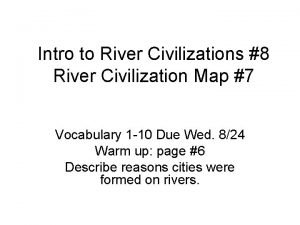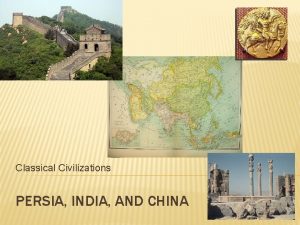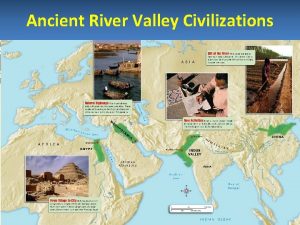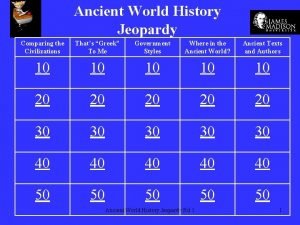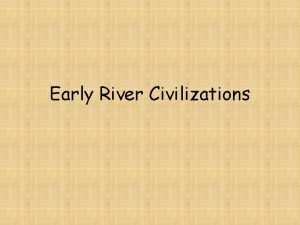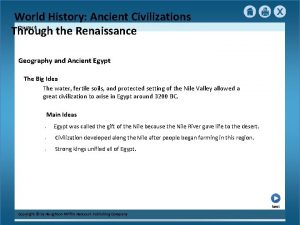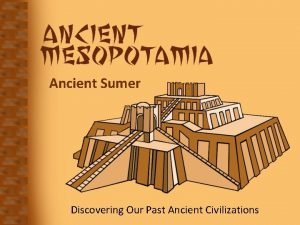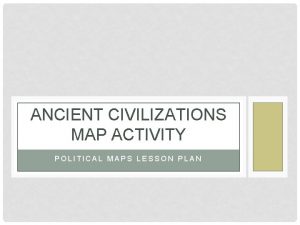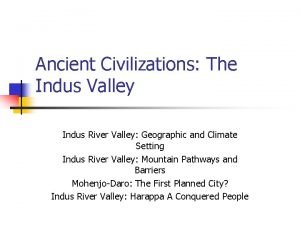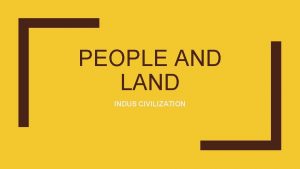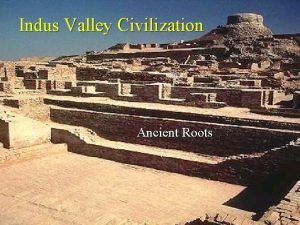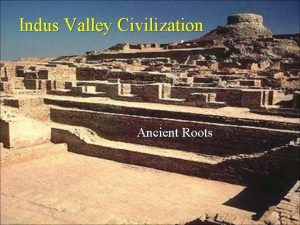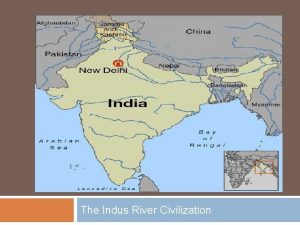Rise of Civilizations Unit 1 Ancient Civilizations Indus












- Slides: 12

Rise of Civilizations Unit 1 Ancient Civilizations

Indus River Valley Civilization • Located in present day Pakistan • Typically a peaceful culture, little and India along the banks of the to no evidence of war or even Indus River having a military • Findings show cities between • IRVC dissapeared by 1500, to 5500 BC and 1500 BC, but the this day no one knows why, hight of their culture was around many believe they were wiped 3000 BC to 2000 BC out by the Aryans or the waterways dried up • Major cities were: Harappa, Dohlavira and Mohenjo-Daro • Their written language has still never been decoded • Known for skilled metal work and pottery

Indus River Valley Civilizations - Contributions • Plowed fields • Sea ports for trade • Planned city layouts • Running water to houses • Sewage away from home • Eggplant • Swimming pools • Public baths • Ceramics • Art was highly thought of in Harappan culture • Most art made with gold, diamonds and other precious gems and metals • money was made with elaborate designs that match building decorations (man with bulls)

Indus River Valley Civilization

Ancient Mesopotamia • Located between the Tigris and Euphrates Rivers, also known as the Fertile Crescent, present day Iraq • A collection of smaller empires united during wars • Each city state/empire had the same deities as each other and allowed women to have some rights • Thrived between 3500 BC and 500 BC • Major empires/city states: Babylon, Assyria, Akkad, Ur, Sumer, Ninevah, Sippar, Susa, Phoenicia and Uruk • Known as skilled warriors, farmers and trade merchants • Written language was created in Phoenicia • Also called the Cradle of Civilization

Ancient Mesopotamia - Contributions • The wheel • Chariots • Wine • Time: hours, minutes, seconds • Sailboats • Irrigation of farm fields • Written language • Oldest known novel - Epic of Gilgamesh • First written system of law (The Code of Hammurabi) • Ziggurats (religious temples)

Ancient Mesopotamia - Polytheism • The Sumerian gods often had human characteristics in that they were sometimes good and sometimes bad. • They also believed in genies, demons, and evil spirits. • They believed that the Earth floated on an ocean of fresh water. • Enlil was said to be so powerful that the other gods could not even look at him. • Greek mythology likely borrowed many ideas from the Mesopotamian gods.

Ancient Mesopotamia

Ancient Persia • Located in present day Iran, but at it's height included all of middle east, parts of Europe/Africa/India/Asia • Thrived between 700 BC until 300 BC when Alexander the Great conquered them • Known for elaborate cities, woven materials, remnants, warriors and mathematicians • Major dynasties/cities include: Persepolis, Bahgdad, Partha, Media, Bactria • Persia will conquer most of the known world but quickly fall to Greece, it will overtake Mesopotamia and the barbarian lands of Eurasia • Technically Persia exsisted until the 1900's when it became Iran

Ancient Persia - Contributions/Key People • Built the first stadium • 1 st to give equal rights • 1 st to give animals rights • Rugs • Qanats (underground water ways) • Post riders • Aramaic Language • Taxation through Satraps • Beer • Astronomy • Darius • Xerxes • Cyrus • Artaxerxes • Hystaspas

Ancient Persia - Religion • Believed in Zoroastrianism • One of the 1 st monotheistic religions in the world • Still practiced in parts of Iran and India but have been hunted to near extinction by the ruling religious leaders of Iran • Considered one of the most peaceful religions in the world • created by a Perisian prophet named Zarathustra or Zoraster • Deity is called Ahura-Mazda or “lord of wisdom”

Ancient Persia
 Rise and rise again until lambs become lions
Rise and rise again until lambs become lions Tricky dick: the rise and fall and rise of richard m. nixon
Tricky dick: the rise and fall and rise of richard m. nixon Little lambs academy
Little lambs academy Rise and rise again until lambs become lions origin
Rise and rise again until lambs become lions origin Yellow river civilization map
Yellow river civilization map Chapter 9 lesson 1 early civilizations
Chapter 9 lesson 1 early civilizations What is it
What is it Civilization ppt template
Civilization ppt template Ancient civilizations jeopardy
Ancient civilizations jeopardy What river is this
What river is this Ancient civilizations through the renaissance
Ancient civilizations through the renaissance Discovering our past ancient civilizations
Discovering our past ancient civilizations Political map activity
Political map activity




